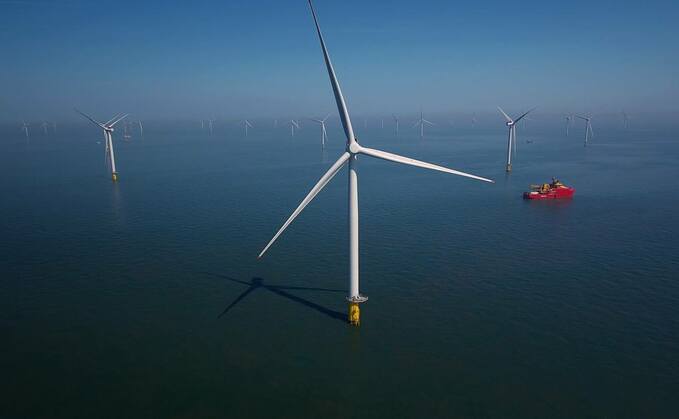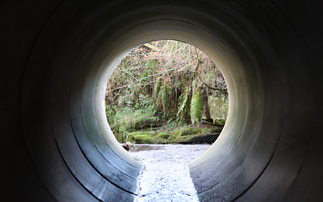
The Race Bank offshore wind farm / Credit: Ørsted
Critics of the net zero transition are trying to blame it for the UK's economic woes, but their arguments are looking increasingly detached from the modern world
The arguments against the net zero transition continue to be toppled, overwhelmed by economic, geopolitical, technological, and atmospheric reality, and undermined by their own rickety internal contradictions.
And yet, so complete is their disconnect from the real world that these zombie arguments continue to stumble across the political landscape desperately looking for an issue, any issue, to attack. Soaring energy bills? Blame net zero. Boris Johnson's downfall? Net zero's fault. A decade of flat-lining productivity and anaemic wage growth? You guessed it, net zero's the cause. Not one of the politicians and media commentators seeking to equate net zero with all the world's ills ever explains precisely how it has caused these bad things to happen. Instead, they simply try to assign the responsibility for the near complete failure of their political and economic project to this apparently amorphous, yet also very real, global industrial revolution, and then move on before anyone notices that their arguments are utterly fantastical. It is a political movement that has taken 'never apologise, never explain' through to its nihilistic end game, where nothing matters and even less makes sense.
It is a Sisyphean task, but those of us clinging to what George W Bush advisor Karl Rove is alleged to have sneeringly described as "the reality based community" (a charge he denies) have little choice but to continue to push back against these zombie arguments and detail how they are becoming less plausible with every passing week. The health and welfare of the millions of households who are worried about soaring energy bills, the UK's long term economic prospects, and the stability of the biosphere itself all depend on these climate sceptic talking points being consigned to the parallel universe in which they belong.
The arguments against the net zero transition can be boiled down to four inter-related critiques: we can't afford it; we don't need to do it; it won't work; and we don't want to take the risk of being the first mover. Far from being strengthened by the soaring gas prices and energy security crunch unleashed by Russia's horrific invasion of Ukraine, each one of these arguments has been drastically weakened in the past few months.
The most visible and emotive attacks on the net zero transition fixate on its supposed cost by attempting to blame decarbonisation for the soaring energy bills that are making so many lives a misery. The problem is that no one has yet provided a coherent explanation as to how energy price spikes caused by soaring fossil gas prices are the fault of measures designed to reduce our reliance on gas.
As Carbon Brief's Simon Evans has repeatedly pointed out, 95 per cent of the projected increase in average domestic energy bills seen over the past year are a direct result of soaring wholesale gas prices. The 'green levies' on energy bills equate to just £150 and are expected to fall in the coming years. Their share of average energy bills is set to drop from around five per cent to just two per cent, as gas prices continue to send energy bills soaring. As the Conservative's Chris Skidmore noted again today, if the government had not previously cut energy efficiency programmes and blocked onshore wind development energy bills would now be lower.
More broadly, the soaring price of gas means the net cost of the net zero transition has become smaller still. Upfront investments in low carbon infrastructure deliver much faster paybacks than they did a year ago, because the fossil fuels they displace are orders of magnitude more expensive. The companies that are best positioned to prosper in the coming recession are those that are furthest along in the net zero transition and as such are least exposed to soaring energy costs and best positioned to win out in the increasingly competitive war for customers and talent. Far from being 'woke', the companies that are vocally pursuing net zero are acting rationally in their own long term interests, just as businesses always have done. The self-proclaimed 'Party of business' used to instinctively understand this phenomenon.
Longer term economic projections are notoriously variable based on the assumptions about the future that underpin them, but it is worth noting that the Climate Change Committee's most recent analysis suggested the net economic impact of delivering the UK's net zero goals has been reversed from a 0.5 per cent loss of GDP to a 0.5 per cent gain, almost entirely as a result of higher fossil fuel prices. It is similarly worth noting that such analyses struggle to quantify the immense co-benefits that come from decarbonisation in the form of reduced climate impacts, improved health outcomes, and cleaner air. There was already a compelling argument that net zero would be net positive for the economy, just as every previous technological revolution has been - soaring fossil fuel prices have made this argument virtually unassailable.
The demonstrable reality is that burning an expensive and polluting source of energy costs more than generating power through clean and lower cost technologies. Concerns about back up power capacity and grid stability - all of which grid operators are confident they can address at reasonable cost - are simply attempts to obfuscate this blindingly obvious truth. The UK would be in a lot better position from an energy cost and security perspective if it had more renewables and electric vehicles, not less. It would be better off still if it had invested in improving energy efficiency and had reformed the energy market to stop prices being set by the cost of gas. To adapt the old saying, the best time to deliver such policies was a decade ago, the second best time is now.
The fractionally more convincing critique of the cost of the net zero transition is that climate policy is somehow to blame for soaring gas prices. If we've deliberately restricted gas supplies then by definition that must have served to push up the price. There may be some truth in this, but it really is a marginal concern compared to the wider problems in the fossil fuel markets - the biggest of which is a warmonger in the Kremlin.
It is the case that in recent years oil and gas majors have been increasing the share of their profits they distribute back to shareholders and generally proving more reluctant to approve higher cost new exploration projects, as they look to pivot their businesses to play a bigger role in emerging clean tech markets. Meanwhile, the UK and others have imposed a moratorium on fracking, as much because of local opposition as any concern over net zero targets. It is clear that some gas production has been foregone.
But oil and gas companies are typically making rational decisions based on the future demand destruction that they expect to result from the clean tech revolution. There may be a moratorium on fracking in the UK currently, but there is also a legal requirement to maximise economic oil and gas extraction from British waters. The idea gas production has been deliberately restricted by policymakers, either here or overseas, is drastically overblown.
And more important still, even if the UK had gone all-in on fracking and offered even more generous tax breaks to North Sea developers it would still not be a big enough producer to have a meaningful impact on global oil and gas prices. Once Europe allowed itself to become over-reliant on Russian gas - a scenario, by the way, that has been exacerbated by the failure to move faster to improve efficiency and deploy clean energy technologies - then there was very little that could be done by way of domestic gas production to protect the continent from soaring prices if the Kremlin chose to weaponise its supplies. It was a grave strategic error, but it had very little to do with net zero.
As the IEA's Fatih Birol observed earlier this year, "unfortunately we are once again seeing claims that volatility in gas and electricity markets is the result of the clean energy transition - these assertions are misleading to say the least".
The objective reality is that fossil gas is at the heart of the current crisis and it is perverse in the extreme to suggest that the technologies that allow our economies to use less gas are somehow the problem, even before you consider the greenhouse gas emissions that result from a continued reliance on fossil fuels.
And we really should consider those greenhouse gas emissions, because they are heating the planet to unprecedented and dangerous levels.
In a new paper earlier this week, the former Brexit Secretary that negotiated the Brexit deal the government is now trying to extricate itself from, Lord 'Frosty' Frost, argued that "current evidence" does "not support the assertion that the UK faced a climate 'emergency'", as he sought to explain how attempts to maintain a habitable biosphere are hampering the UK economy.
Now, the precise definition of a 'climate emergency' is a value judgement, but the problem for Lord Frost and his fellow travellers is that the record breaking temperatures of over 40C that lead to yet more demands being placed on already overwhelmed hospitals and threaten to drive up food prices still further feel pretty emergency-adjacent for many people. The argument that we can just adapt to future climate impacts when we are not even adapting to current climate impacts, let alone the much bigger systemic threats in the pipeline, simply fails to pass the sniff test. There are good reasons why polling consistently shows massive majorities support bolder climate action and the net zero transition, and it is not because the public have been brainwashed by the 'green blob'.
Whether you call it an emergency, a threat, a crisis, a cataclysm, or simply a new normal that we will all have to adjust to, the pressure climate impacts will place on food production, infrastructure, global supply chains, geopolitical tensions, and migratory flows are so obvious and so severe that no responsible government or business can afford to ignore them. These pressures will continue to intensify until net zero global emissions are achieved and a more climate resilient civilisation is built. That is why we need to deliver net zero emissions and why over 90 per cent of the global economy is committed to doing just that. Like so much of the thinking that originates from the libertarian right, the idea we can delay or abandon the net zero transition is failing to survive contact with reality.
The argument that the net zero transition simply can not be delivered without diminishing living standards is fractionally more compelling, but once again it runs counter to a growing body of real-world evidence and expert opinion. It is fair to say there are industries where decarbonisation remains technically challenging and eye-wateringly expensive. It is also true that just as we've never tried to maintain a global economy in the face of runaway global warming, we've also never managed to operate a modern economy with net zero emissions. Like every great human endeavour this is a high stakes experiment.
But somewhat ironically it is in the areas that critics of the net zero transition attack the most that we are seeing the most rapid and effective progress. Frost and his allies repeatedly argue that if we have to deliver net zero we should do it through next generation nuclear technologies and carbon capture and storage systems that are yet to be invented or deployed at scale. Both of these areas require further support and investment - alongside increased R&D spending on hydrogen, green shipping and aviation technologies, and sustainable agricultural practices - so as to ensure emissions reductions can be extended to hard to decarbonise sectors from the 2030s onwards. But it is the clean technologies that are being deployed right now that provide the clearest evidence that a net zero emission economy can be constructed without damaging the economy. All around the world, renewables-dominated grids powered by ultra-low cost wind, solar, and battery projects, passivhaus building standards, and heat pumps are demonstrating how we can drastically curb emissions from critical infrastructure while reducing costs and ensuring grids remain reliable.
Frost may regard wind turbines as medieval (which is a weird bracket in which to put Michael Faraday), but this technology is providing the backbone for very modern energy systems. Meanwhile, the electric vehicles that Frost dismisses as "unsatisfactory" are the only part of the auto market that is growing, as drivers conclude that zero emissions motoring is not just satisfactory, but positively enjoyable. Those engineers actually working on these technologies are proving each and every day that they are reliable and effective. They are confident net zero emission energy systems can be built. As one commentator on Twitter noted in response to Frost's latest missive, you know what is actually medieval? Burning stuff.
The final zombie argument against the net zero transition used to be one of the most convincing: what is the point of us decarbonising if others won't do likewise?
But, once again, this shortsighted concern has been mugged by reality. The latest calls for the UK to dilute its net zero ambitions come just hours are the US Senate finally passed sweeping climate legislation for the first time. The details contained in the Bill - $369bn of climate spending, long term tax credits across multiple clean tech sectors, new methane taxes and direct R&D investment - are important, but what is more interesting is how the Inflation Reduction Act (IRA) is framed. The plan is to catalyse a US domestic clean tech supply chain, create good-paying jobs that cannot be outsourced, and boost America's chances of outcompeting China. It is an industrial and geopolitical strategy doubling up as a climate strategy.
There are regional variations, but this is essentially the same plan that all serious governments are now pursuing. The EU's response to the crisis precipitated by Vladimir Putin is to invest billions more in clean technologies and energy efficiency. China's long term economic plans are centred on it entrenching its position as a clean tech superpower. It may be building more coal plants, but it is intending to use them less and less as massive new renewables and nuclear capacity comes online. India just published a strengthened climate strategy based on a massive increase in renewables deployment this decade. Australia is belatedly coming to the party with a new emissions targets and offshore wind and solar plans. Far from taking on too much first mover risk, the UK could quickly find itself as a laggard in a global industrial revolution, ensuring its economy remains reliant on expensive gas just as its main competitors get themselves off the fossil fuel hook and watch their productivity and energy security soar as a result.
In a must-read column last week, the Telegraph's Ambrose Evans-Pritchard took aim at the net zero sceptics, accusing them of betraying Margaret Thatcher's legacy and undermining the only credible long term growth strategy available to the UK. Citing a recent report from Goldman Sachs, Rishi Sunak's alma mater, he highlighted projections that show how "the old order will be swept away at a torrid pace and the next super-billionaires will be in green hydrogen, electrolysis, energy storage, and so on". This industrial revolution can be delivered while driving down energy costs, Evans-Pritchard argued, noting how the IMF reckons energy's share of GDP will halve from four to two per cent by 2050. "It is a gain, not a cost," he added.
This is, for Evans-Pritchard, a deeply conservative project. "The Burkean Conservative code is cross-generational duty, the Contract of Eternal Society, "a partnership not only between those that are living, but between those who are living, those who are dead, and those who are to be born"," he wrote. "It was the code of Margaret Thatcher who invoked our collective responsibility as "stewards of the Earth"."
But when it comes to the net zero transition another famous Thatcherite line comes to mind. When you look at the paucity of the zombie arguments arrayed against the UK's net zero strategy - the siren voices suggesting the best response to soaring gas prices is to increase our reliance on gas, the failed ministers arguing that fracking wells and uninvented innovations offer a better path forward than proven, cost competitive technologies, the parochial insistence the UK knows better than every other major economy on the planet - it quickly becomes clear that there is no alternative.
Want to find out more about how the net zero transition could impact your business? Sign up now to join us at the Net Zero Festival in London on September 28th and 29th.









